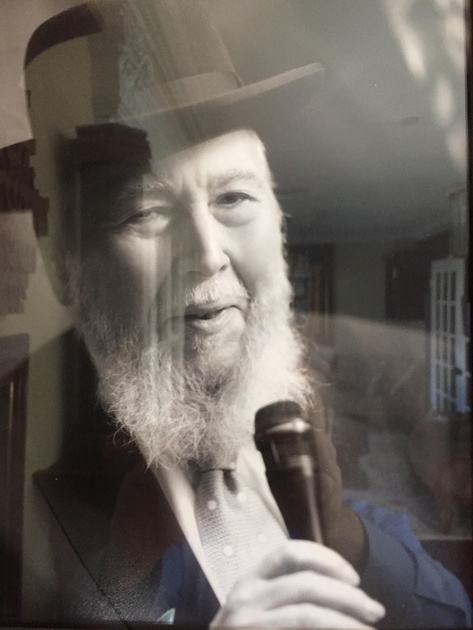
ūĢų┤ūÖū®ūüųĘūóų░ūÖųĖūöūĢų╝ ū×ųĘūÉūÖ ūæų╝ųĖūóųĄūÖ ūöųĖū¬ųĖūØ? ūÉųĖū×ųĘū© ū©ųĘūæų╝ųĖūö ūæų╝ųĘū© ūæų╝ųĘū© ūŚųĖūĀųĖūö ūÉųĖū×ųĘū© ū©ųĘūæų╝ų┤ūÖ ūÖūĢų╣ūŚųĖūĀųĖū¤: ū×ų░ū£ųĘū×ų╝ųĄūō ū®ūüųČūŚųĖū£ųĖūö ūŚų┤ū¢ų░ū¦ų┤ūÖų╝ųĖūö, ūĢų░ūöųĖū£ųĘūÜų░ ūÖų░ū®ūüųĘūóų░ūÖųĖūöūĢų╝ ūĢų░ūöūĢų╣ū®ūüų┤ūÖūæ ūÖų░ū®ūüų┤ūÖūæųĖūö ūóųĘū£ ūżų╝ų┤ū¬ų░ūŚūĢų╣.
The Gemara asks about the Biblical narrative cited above: What did Isaiah need to do there in the middle court, i.e., why was he there? The Gemara answers: Rabba bar bar ßĖżana said that Rabbi YoßĖźanan said: This teaches that Hezekiah took ill, and Isaiah went and established a Torah academy at his door, so that Torah scholars would sit and occupy themselves with Torah outside his room, the merit of which would help Hezekiah survive.
ū×ų┤ūøų╝ųĖūÉū¤ ū£ų░ū¬ųĘū£ų░ū×ų┤ūÖūō ūŚųĖūøųĖūØ ū®ūüųČūŚųĖū£ųĖūö, ū®ūüųČū×ų╝ūĢų╣ū®ūüų┤ūÖūæų┤ūÖū¤ ūÖų░ū®ūüų┤ūÖūæųĖūö ūóųĘū£ ūżų╝ų┤ū¬ų░ūŚūĢų╣. ūĢų░ū£ųĖūÉūĢ ū×ų┤ūÖū£ų╝ų░ū¬ųĖūÉ ūöų┤ūÖūÉ, ūōų╝ų┤ūÖū£ų░ū×ųĖūÉ ūÉųĖū¬ųĄūÖ ū£ų░ūÉų┤ūÖūÆų╝ųĖū©ūĢų╣ūÖųĄūÖ ūæų╝ųĄūÖūöų╝ ū®ūéųĖūśųĖū¤.
Based on this, it is derived, with regard to a Torah scholar who took ill, that one establishes an academy at the entrance to his home. The Gemara comments: This, however, is not a proper course of action, as perhaps they will come to provoke Satan against him. Challenging Satan might worsen the health of a sick person rather than improve it.
for Video Shiur click here to listen: Psychology of the DAF Eruvin 26
ūæū¤ ūÖūöūĢūÖūōūó
ūĢų░ū£ųĖūÉūĢ ū×ų┤ū£ų╝ų░ū¬ųĖūÉ ūöų┤ūÖūÉ, ūōų╝ų┤ū£ų░ū×ųĖūÉ ūÉųĘū¬ų╝ų┤ūÖ ū£ų░ūÉų┤ūÖūÆų░ū©ūĢų╝ūÖųĄūÖ ūæų╝ų░ū®ūéųĖūśųĖū¤. ūĀū©ūÉūö ū£ūÖ ūÉūÖū¤ ūøūĢūĀū¬ ūöūÆū×ū©ūÉ ū£ūōūŚūĢū¬ ūĪūæū©ū¬ ūÖū®ūóūÖūö ūöūó"ūö ūōū×ūÖ ūÖūĢūøū£ ū£ūżū¦ūżū¦ ūĢū£ūōūŚūĢū¬ ū×ūóū®ūö ūĀūæūÖūÉ ūÉū®ū© ū©ūĢų╝ūŚųĘ ūöų│' ūōų┤ų╝ūæųČų╝ū© ūæų╝ūĢų╣ ūÉūÜ ūöūøūĢūĀūö ūøū×ūĢ ū®ūøū¬ūæ ūöū©ūÖūśūæ"ūÉ ū¢"ū£: 'ūĢū£ūÉ ūöūÖūÉ' ūżūÖū©ūĢū® ū£ū¬ū£ū×ūÖūōūÖ ūŚūøū×ūÖūØ ūæūóū£ū×ūÉ ū£ūÖūøūÉ ū£ū×ūóūæūō ūøū×ūĢ ū®ūóū®ūö ūÖū®ūóūÖūö ū®ūöūÖūö ūĀūæūÖūÉ ūĢū”ūōūÖū¦ ūÆū×ūĢū© ūóūø"ū£, ūĢūóūÖūÖū¤ ū×ūöū©ū®"ūÉ ū×ūö ū®ūøū¬ūæ ūæū¢ūö ūĢū£ūÉ ū©ūÉūö ūōūæū©ūÖ ūöū©ūÖūśūæ"ūÉ ūöūĀū¢ūøū© ūĢūöūĢūÉ ūöūæūÖū¤ ūŚū®ū® ūöūĀūÖūōūĢūÖ ūöūĢūÉ ūóū£ ūöūŚūĢū£ūö ūóū”ū×ūĢ ūĢū£ūøū¤ ūżūÖū©ū® ūöūśūóūØ ūæūōū©ūÜ ūÉūŚū© ūĢūÖ"ū£ ūæūōūæū©ūÖūĢ ūĢū¦"ū£.
What is the concept of ūōų╝ų┤ūÖū£ų░ū×ųĖūÉ ūÉųĖū¬ųĄūÖ ū£ų░ūÉų┤ūÖūÆų╝ųĖū©ūĢų╣ūÖųĄūÖ ūæų╝ųĄūÖūöų╝ ū®ūéųĖūśųĖū¤?
A similar phrase is used in Succah 38a
ū®ūÖū©ūÖ ū×ū”ūĢūö ū×ūóūøūæūÖū¤ ūÉū¬ ūöūżūĢū©ūóūĀūĢū¬ ū®ūöū©ūÖ ū¬ūĀūĢūżūö ū®ūÖū©ūÖ ū×ū”ūĢūö ūöūÖūÉ ūĢūóūĢū”ū©ū¬ ū©ūĢūŚūĢū¬ ūĢūśū£ū£ūÖūØ ū©ūóūÖūØ ūĢūÉū×ū© ū©ūæūÉ ūĢūøū¤ ūæū£ūĢū£ūæ ū©ūæ ūÉūŚūÉ ūæū© ūÖūóū¦ūæ ū×ū×ūśūÖ ū£ūÖūö ūĢū×ūÖūÖū¬ūÖ ū£ūÖūö ūÉū×ū© ūōūÖū¤ ūÆūÖū©ūÉ ūæūóūÖūĀūÖūö ūōūĪūśūĀūÉ ūĢū£ūÉūĢ ū×ū£ū¬ūÉ ūöūÖūÉ ū×ū®ūĢūØ ūōūÉū¬ūÖ ū£ūÉūÖūÆū©ūĢūÖūÖ ūæūÖūö:
non-essential aspects of a mitzva avert calamity, as waving is a non-essential aspect of the mitzva, since even if one failed to wave the loaves he fulfilled his obligation, and nevertheless it halts harmful winds and dews. And Rava said: And likewise one should conduct himself the same way with a lulav, i.e., one should wave it to and fro and raise and lower it for the same reasons. When Rav AßĖźa bar Ya’akov would move the lulav to and fro, he would say: This is an arrow in the eye of Satan, as despite his best efforts, the Jewish people continue to joyously fulfill mitzvot. The Gemara notes: That is not a proper manner of conduct, as it will induce Satan to come to incite him to sin. Gloating due to his victory over the evil inclination will lead Satan to redouble his efforts to corrupt him.
ū©ū®ū┤ū│ ū®ūØ
ūÆūÖū©ūÉ ūæūóūÖūĀūÖūö ūōūĪūśūĀūÉ - ūöū©ūÖ ū¢ūö ū£ūŚūź ūæūóūÖūĀūÖūĢ ū®ū£ ū®ūśū¤ ū®ū©ūĢūÉūö ūæūóūÖūĀūÖūĢ ū®ūÉūÖū¤ ūæūĢ ūøūŚ ū£ūĀū¬ū¦ ū×ūóū£ūÖūĀūĢ ūóūĢū£ ū×ū”ūĢū¬:
ū£ūÉūÖūÆūĢū©ūÖūÖ - ū®ūÖū¬ūÆū©ūö ūæūĢ ū®ūśū¤ ū®ūöūĢūÉ ūÖū”ū© ūöū©ūó ūĢūÖū®ūÖūÉūĀūĢ ū£ū¬ūóūĢū¬ ū×ūóū£ ū¦ūĢūĀūĢ ūĢūÖū×ūĪūĢū© ūóū”ū×ūĢ ūóū£ ūöūōūæū©:
From this Rashi we see the satan can be the yetzer hara. Perhaps the peshat is that if people would make such a big focus, and then the tactic did not work (such as there was not enough merit), then people would become dispirited and lose hope.
Note Bava Basra 16a
ūÉū×ū© ū©"ū£ ūöūĢūÉ ū®ūśū¤ ūöūĢūÉ ūÖū”ū© ūöū©ūó ūöūĢūÉ ū×ū£ūÉūÜ ūöū×ūĢū¬
Reish Lakish says: Satan, the evil inclination, and the Angel of Death are one, that is, they are three aspects of the same essence.
We do find a similar idea in the following Gemara Taanis 14b, that a typical person should not pray publicly by prostration, because he may not he answered and then it will look bad.
ūÉū×ū© ū©' ūÉū£ūóū¢ū© ūÉūÖū¤ ūÉūōūØ ūŚū®ūĢūæ ū©ū®ūÉūÖ ū£ūÖūżūĢū£ ūóū£ ūżūĀūÖūĢ ūÉū£ūÉ ūÉūØ ūøū¤ ūĀūóūĀūö ūøūÖūöūĢū®ūó ūæū¤ ūĀūĢū¤ ū®ūĀūÉū×ū© (ūÖūöūĢū®ūó ū¢, ūÖ) ūĢūÖūÉū×ū© ūö' ūÉū£ ūÖūöūĢū®ūó ū¦ūĢūØ ū£ūÜ ū£ū×ūö ū¢ūö ūÉū¬ūö ūĀūĢūżū£ ūóū£ ūżūĀūÖūÜ
ū¦ūÖūōūĢū®ūÖū¤ ūøūś, ūæ - ū£, ūÉ
ūÉū×ū© ū©ūæ ūŚūĪūōūÉ ūöūÉūÖ ūōūóūōūÖūżūĀūÉ ū×ūŚūæū©ūÉūÖ ūōūĀūĪūÖūæūĀūÉ ūæū®ūÖū¬ūĪū© ūĢūÉūÖ ūöūĢūö ūĀūĪūÖūæūĀūÉ ūæūÉū©ūæūÖūĪū© ūöūĢūö ūÉū×ūÖūĀūÉ ū£ū®ūśū¤ ūÆūÖū©ūÉ ūæūóūÖūĀūÖūÜ
Rav ßĖżisda said: The fact that I am superior to my colleagues is because I married at the age of sixteen, and if I would have married at the age of fourteen, I would say to the Satan: An arrow in your eye, i.e., I would not be afraid of the evil inclination at all.
Maybe here too that is why he only talks about marrying at 14, but he didn’t do it because it would lead to trouble. The idea that they were trying to say in shorthand is that one cannot be too clever in trying to outsmart the Satan. If you try to marry too early, other challenges such as parnassah or relationship concerns could develop. If you try too hard via prayer, especially in a public manner, it could lead to frustration and disillusionment.
Even the Gemara Succah can be understood in the same light. The public display of piety would incite scoffing or perhaps if something bad occurred to Rav Acha it would lead people to scoff that he prayed so much and look what fate befell him. The lesson is that working consistently and meaningfully on something often yields good results, however working too hard and too intensely can backfire in a variety of ways
for Video Shiur click here to listen: Psychology of the DAF Eruvin 26
Translations Courtesy of Sefaria
Photo Abba Mari Rav Chaim Feuerman, Ed.D. ZT"L Leiyluy Nishmaso

 Previous
Previous
